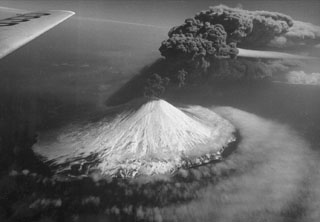Report on Alaid (Russia) — 27 July-2 August 2016
Smithsonian Institution / US Geological Survey
Weekly Volcanic Activity Report, 27 July-2 August 2016
Managing Editor: Sally Sennert.
Please cite this report as:
Global Volcanism Program, 2016. Report on Alaid (Russia) (Sennert, S, ed.). Weekly Volcanic Activity Report, 27 July-2 August 2016. Smithsonian Institution and US Geological Survey.
Alaid
Russia
50.861°N, 155.565°E; summit elev. 2285 m
All times are local (unless otherwise noted)
KVERT reported that Strombolian activity at a new cinder cone in Alaid’s summit crater was detected during 22-29 July, with lava flowing down the SW flank. On 26 July satellite images showed a thermal anomaly at the volcano, and a gas-and-steam plume that drifted 155 km NE. The Aviation Color Code remained at Orange (the second highest level on a four-color scale).
Geological Summary. The highest and northernmost volcano of the Kuril Islands, Alaid is a symmetrical stratovolcano when viewed from the north, but has a 1.5-km-wide summit crater that is breached open to the south. This basaltic to basaltic-andesite volcano is the northernmost of a chain constructed west of the main Kuril archipelago. Numerous pyroclastic cones are present the lower flanks, particularly on the NW and SE sides, including an offshore cone formed during the 1933-34 eruption. Strong explosive eruptions have occurred from the summit crater beginning in the 18th century. Reports of eruptions in 1770, 1789, 1821, 1829, 1843, 1848, and 1858 were considered incorrect by Gorshkov (1970). Explosive eruptions in 1790 and 1981 were among the largest reported in the Kuril Islands.

